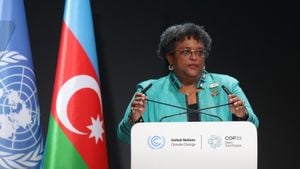Speculation is rife about what Donald Trump’s imminent return to the White House means for the environment and climate policy as he prepares to take the presidency for the second time. His track record during his first term gives insights, showing strong inclinations toward fossil fuel expansion.
One of Trump's most controversial proposals would be lifting restrictions on oil and gas drilling on federal lands, particularly targeting areas rich with resources. Leaders from Alaska, heavily reliant on oil revenues, are openly hopeful about this shift. They believe it will undo the perceived constraints set by the Biden administration, which they feel have stifled production.
During his campaign, Trump expressed intentions to fully restore drilling rights, with Alaska's politicians rallying behind these efforts to boost their economy. The Arctic National Wildlife Refuge (ANWR), often at the center of these debates, poses significant ethical and environmental dilemmas. Many Alaska Native tribes express concern over the potential impact on wildlife and their traditional ways of life. Some, meanwhile, firmly believe drilling could inject much-needed funds and jobs.
The ANWR is vast; it encompasses diverse ecosystems and habitats, supporting wildlife like polar bears and migratory birds. An analysis suggested the coastal plain might contain billions of barrels of recoverable oil, tempting politicians to pursue its development aggressively. Yet, there’s mounting worry over litigation and the environmental consequences of increased drilling.
Trump is also expected to take drastic actions akin to ‘dismantling’ previous administrations’ climate initiatives. The reintroduction of tax breaks for fossil fuel companies, alongside significantly relaxing pollution rules, would signal clear priorities favoring industry over environmental concerns. The administration's potential withdrawal from the Paris climate agreement reflects this attitude—Trump has been vocally skeptical of commitments made during the previous regime.
The consequences of these moves could ripple across industries and lead to increased greenhouse gas emissions. The simple fact remains: more fossil fuel production equals more emissions, creating barriers to achieving climate goals. Trump’s philosophy seems grounded less on balancing environmental sustainability and economic growth and more focused on immediate economic uplift from fossil fuel exploitation.
His administration might reverse progress made by the Biden administration on clean energy, such as rolling back incentives aimed at renewables and inefficient energy practices. This possibility, rooted deeply within his campaign promises and early appointments—including Chris Wright, noted for his advocacy of the fossil fuel sector—sets the stage for sweeping changes once he officially commences his term.
Environmentalists and climate scientists provide data supporting the urgency of reducing fossil fuel reliance. The rising global temperatures and extreme weather events serve as stark reminders of the planetary risks. Consequently, Trump's intended policies raise questions and concerns about consistency with global climate goals, which aim to curb emissions drastically to mitigate climate change.
Public health is yet another aspect likely to be examined under his administration's approach. Trump’s tendency to neglect environmental health standards indicates potential cuts to regulations intended to protect communities from harmful pollutants. Reintroducing leniencies on emissions regulations would likely have immediate effects, allowing toxins to proliferate without restraint.
Throughout his presidency, Trump made gestures to phase out environmental justice initiatives sparked during Biden's term, echoing sentiments from his last administration. Critics assert this could hinder efforts to prioritize marginalized communities facing the brunt of pollution and industrial encroachments, which would exacerbate social and health inequities.
Looking on the international front, detaching from the collaborative climate efforts existing prior fuels concern among climate activists and scientists. Trump’s administration could likely stall necessary commitments from the U.S., historically one of the largest polluters. The distrust fueled by his remarks during the campaign indicates reluctance to lead once more on the global stage.
Rumors suggest he might propose sizable reductions to national monuments, which protect vast stretches of ecological and historical significance. If enacted, this could transform significant landscapes, making them vulnerable to industrial exploitation.
Though Trump’s administration is meant to return to conservative policies prioritizing development grounded on fossil fuels, the pushback from advocates intent on combating climate change might provoke strife. Ongoing protests and push for cleaner alternatives echo from environmental groups appeased with fossil fuel management strategies are failing us, contrarily seeking renewable energy frameworks as the sovereign solution for future interests.
Trump's proposed strategies have palpable partisan backing and outright opposition, creating tension among voters and activists alike. How these policies unfurl could mark significant shifts not only for America's environmental stance but also its economic and humanitarian future.
With his second term fast approaching, and as the country contemplates what changes to expect policy-wise, one thing is sure: the debate over energy, conservation, and climate adaptation is far from settled. The stakes are high, with populations deeply invested on both sides weighing their futures against Trump’s next moves.



